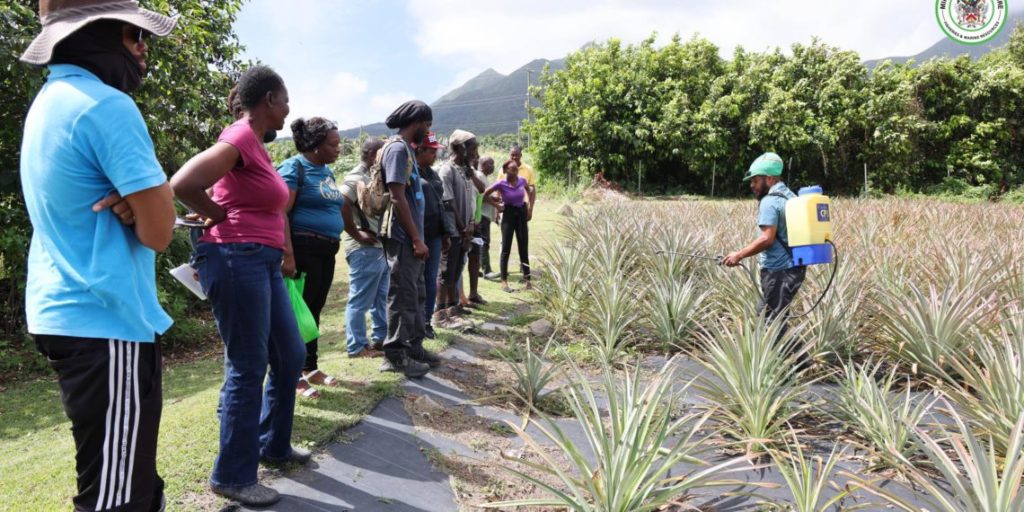Government-Led Technical Assistance Increases Pineapple Production in St. Kitts
The Department of Agriculture in St. Kitts and Nevis recently conducted a comprehensive pineapple cultivation training program for local farmers, as part of the government’s ongoing commitment to bolstering the agricultural sector and enhancing food security. This initiative underscores the administration’s focus on providing technical assistance and empowering farmers to improve productivity and crop quality, thereby contributing to the overall economic growth of the twin-island nation. The training session, held at the Tabernacle Outreach Centre, specifically targeted farmers who had previously received pineapple suckers from the department, ensuring a direct application of the newly acquired knowledge and skills.
The training program encompassed a wide range of essential topics crucial for successful pineapple cultivation. Led by Mr. Dion Weekes, Agriculture Extension Officer for District 3, the session provided practical, hands-on instruction, including live demonstrations of proper planting techniques. Emphasis was placed on maintaining optimal spacing between plants – 12 inches apart within rows and three feet between rows – to facilitate effective management and maximize yield. Furthermore, the importance of sanitation in pineapple farming was highlighted, underscoring the need to keep plants clean to prevent disease and promote healthy growth.
Beyond the foundational aspects of planting and spacing, the training delved into the critical area of pest and disease management. Mr. Weekes stressed the vulnerability of pineapples to various pests, including spiders, mice, ants, and fungal infections, despite their seemingly robust exterior. He emphasized the necessity of regular monitoring and early intervention to mitigate potential damage. Additionally, he advised farmers to carefully manage water exposure, particularly rainfall, as excessive moisture can lead to rotting and significant crop loss.
The training session also addressed the significant market potential for pineapples in St. Kitts and Nevis. Mr. Weekes expressed optimism about the future of pineapple production, citing the current inability of local supply to meet existing demand. He further discussed value-added opportunities, encouraging farmers to explore processing pineapples into products like slices, juices, and diced pieces, thereby expanding their income streams and contributing to a more diversified agricultural landscape. The rapid propagation potential of pineapple plants, with each plant capable of producing up to five slips within a relatively short period, offers significant scope for rapid expansion of production. This, coupled with the Department of Agriculture’s commitment to continuous support and coordination, paints a promising picture for the future of pineapple farming in the region.
The training proved to be a valuable resource for participating farmers, equipping them with the knowledge and skills necessary to improve their farming practices and capitalize on the growing market demand for pineapples. Damion Cannonier, a crop farmer who attended the session, expressed his gratitude for the timely and essential training. He highlighted the practical benefits gained, particularly in areas such as pre-transplant slip treatment, inducing flowering, and identifying pests and fungal diseases. Cannonier’s testimony underscores the tangible impact of the program in empowering farmers and enhancing their capacity for success.
The comprehensive nature of the training, covering aspects from pest control and soil management to watering and spacing, reflects the government’s commitment to providing holistic support to the agricultural sector. This initiative not only strengthens the local pineapple industry but also contributes to the broader goals of enhancing food security and promoting economic diversification in St. Kitts and Nevis. The combination of practical training, ongoing support from the Department of Agriculture, and a favorable market environment creates a fertile ground for the continued growth and prosperity of pineapple farming in the region. The success of this program serves as a model for future initiatives aimed at empowering local farmers and strengthening the agricultural sector as a whole.
Share this content:












Post Comment